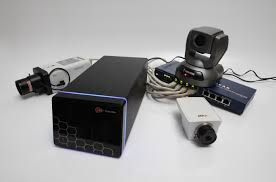
When thinking about surveillance technology, most people will see a picture of CCTV in their minds; however, there have been plenty of innovations since the grainy quality of the original CCTV cameras. Let’s take a look.
IP cameras
Firstly, we should explain what IP means: internet protocol. As the name would suggest, IP cameras use the internet to transmit data, meaning you can view the footage anywhere with a secure connection.
This most often takes the form of a website link or an app provided by the camera’s manufacturer and allows easy access via your smartphone wherever you may be. This provides an advantage over most CCTV systems, which require you to be at the location of the monitor and DVR (digital video recorder).
IP cameras will also typically have higher-quality video and provide notifications along with more specific detection methods.
CCTV
CCTV, on the other hand, is a wired camera setup. It typically has two cables: one that provides power and one that transfers footage to a data storage unit. Some variations, such as Power over Ethernet (PoE), use one cable for both functions, allowing for easier installation and repairs.
A common misconception is that IP cameras and wireless CCTV cameras are the same; however, IP cameras are separate, as wireless CCTV often requires a connection to a power source. The ‘wireless’ in the name refers to the method of data transfer rather than the device.
CCTV remains helpful due to its tenacious connectivity, as the wires that keep it powered can be far more reliable than wi-fi connections. It also remains useful for other practices, such as a CCTV drain survey Nottingham. Details of such services are available from specialists such as www.wilkinson-env.co.uk/drainage-services-cctv-surveys-midlands/cctv-drain-surveys/cctv-drain-surveys-nottingham.
A somewhat unusual advantage of CCTV is its overtness. This seems counterintuitive until you factor in that burglars don’t want to be seen. CCTV can act as a deterrent by being more conspicuous, unlike the stealthier IP cameras. Preventing a burglary will always be more helpful than recording one, and CCTV can help with both.







